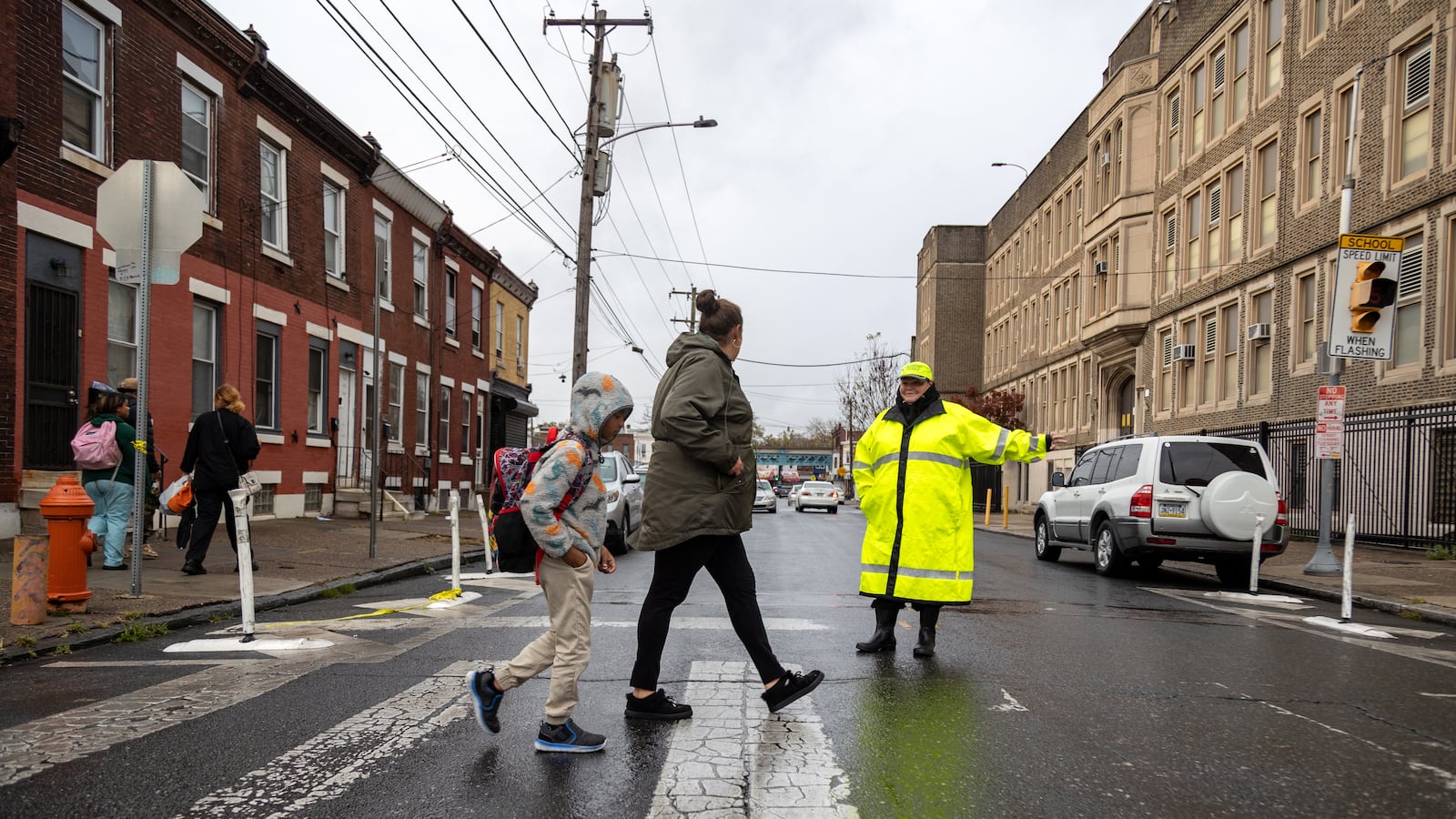This story was reported in partnership with Kensington Voice and made possible by the Philadelphia Journalism Collaborative.
Kensington’s Willard Elementary School is getting its first playground. It’s also getting something less whimsical: a bullet-resistant fence.
Both have an unusual funding source: drug companies that fueled the opioid crisis in the school’s backyard.
Willard Principal Diana Garcia said that every child across Philadelphia should get 30 minutes of play time outside. But students in Kensington miss out. The neighborhood lacks safe, green spaces. Instead, face-to-face with the city’s opioid crisis in one of its most impoverished neighborhoods, students are surrounded by gun violence, drug use, trash, and used needles.
Garcia has a blunt way of putting the situation: Kids in Kensington “don’t have basic human rights.” But the play space will help “students feel safe, reminding them that they are kids, that they’re special,” she said.
The crisis that schools in the neighborhood are enduring and trying to redress is traumatizing students. As drugs have ravaged the community, many families have chosen to send their kids to schools outside the neighborhood.
Enrollment in the district as a whole has dropped by about 16% since 2013. But the fall has been even more steep in Kensington schools: Enrollment at Russell Conwell Middle School, for example, fell by 80% from 2014 to 2023. Willard’s enrollment has dropped by half.
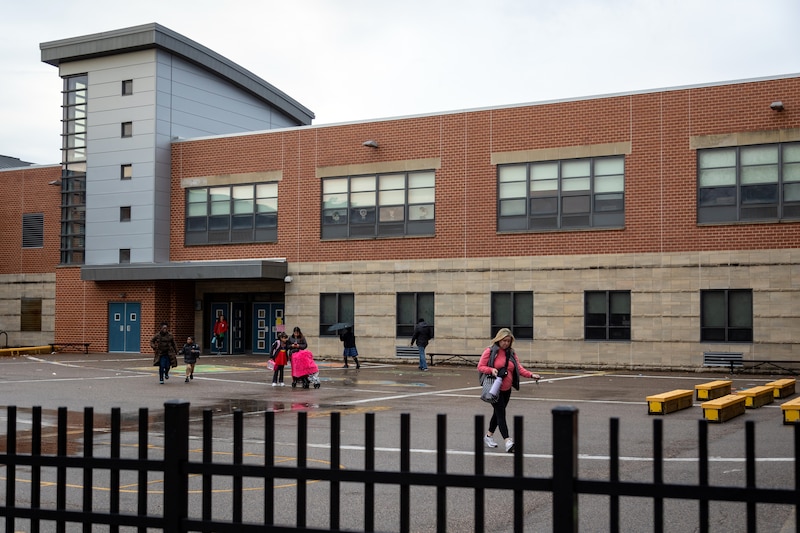
Six schools in Kensington are purchasing a variety of improvements using money from a federal lawsuit against drug manufacturers and distributors for their role in generating the opioid crisis. They’re using the money to pay for safety fencing, a new fitness center, playground updates, a bilingual climate specialist, and more. The school leaders hope these changes will provide more secure and beautiful environments for students who have had to endure so much. They also hope the money will help students succeed in school and beyond.
These Kensington schools are receiving about $333,000 each out of the $20 million that Philadelphia received in 2023. In addition to Willard and Conwell, the schools receiving this funding are Gloria Casarez Elementary School, Lewis Elkin Elementary School, Jules E. Mastbaum High School, and John H. Webster Elementary School.
All six schools enroll mostly Black and Latino students, and 100% of students at these schools are economically disadvantaged.
An initial vote this summer by a state trust overseeing how local governments use opioid settlement dollars said the plan for money earmarked for Kensington schools didn’t comply with federal guidelines.
Philadelphia officials defended the plan during an October hearing. Keli McLoyd, director of Philadelphia’s Overdose Response Unit, argued that Kensington children are particularly vulnerable to the risk of opioid use and overdose.
State Sen. Greg Rothman, a Republican who is on the state trust, voted against the Kensington school spending in the summer. But after touring the neighborhood, he said he felt differently.
“If you had asked me this morning how many kids live in Kensington, I would’ve said, ‘There are no kids in Kensington,’” he said. “I just saw [a school] a half a block from where we were walking.”
Ultimately, the state officials reversed course and agreed to the spending on schools. Still, school principals in Kensington say the funding is a drop in the bucket for what students need.
“The kids in this neighborhood deserve every penny that comes their way to make anything better for their lives,” Garcia said. “I don’t know if the folks who make decisions understand what our five to nine year olds have to endure just to make it to school.”
Schools want families to be safer in Kensington
After gathering input from parents, students, and educators, and feasibility studies by the school district, each school devised individual spending plans.
Awilda Balbuena, the principal of Gloria Casarez Elementary, said because the opioid settlement money represented one-time aid, they had to spend on items that don’t require ongoing funding.
Garcia said her number one priority was increasing safety.
In addition to a new playground, Willard is using a large chunk of the settlement money on a new fencing made from material resistant to bullets and high enough to deter trespassing and encampments.
The new fencing, Garcia said, will help make families feel safer “and that’ll help relieve some burdens and some trauma, that will allow them to learn better.”
Casarez Elementary is expanding its playground, replacing cement with AstroTurf, and planting trees in its school yard. It’s also getting a cover over its play structure to protect kids from the rain. The trees and seating underneath will offer respite in a school yard with no shade, said Balbuena.
Balbuena said her families say they don’t go to the nearest park, McVeigh Recreation Center, out of safety concerns. And whenever she asks for feedback from her families, they say, “‘We need a bigger schoolyard. Our kids need a place to play,’” Balbuena said.
Witnessing the schoolyard expand, Balbuena said, “They can feel that their voices were heard. That’s empowering.”
Casarez is also building a sensory wellness room — a space designed to calm kids who are exposed to trauma and chronic stress and students with sensory needs like those with ADHD and autism.
While Balbuena expressed gratitude for the funding, she said it’s not enough.
“I hope no one thinks for one minute that the $2 million that was awarded to the six schools is going to, for one minute, erase what our kids have seen during this opioid epidemic,” Balbuena said. “This is a band aid to an open chest wound.”
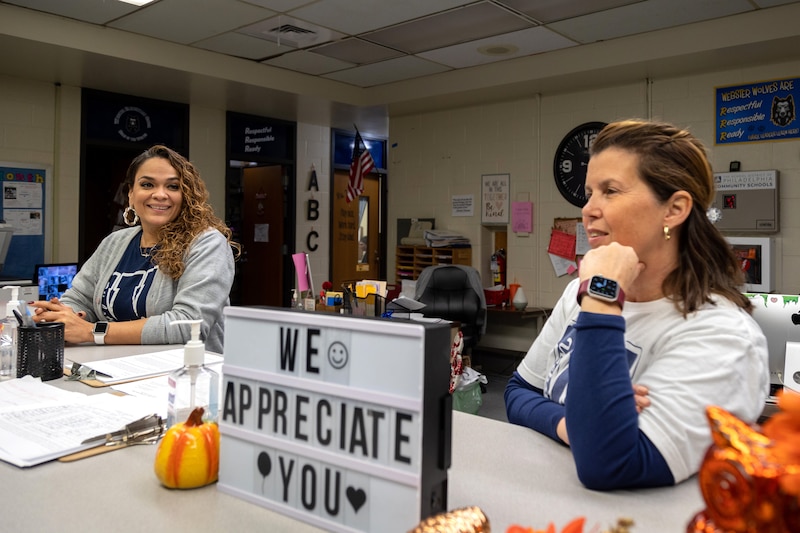
At Webster Elementary, Principal Sherri Arabia has myriad plans for the settlement money.
Most of the school’s opioid settlement funds is paying for a bilingual climate specialist for the next two years. The role was filled by a climate support staff member, Vivian Virola-Romero, who already has relationships with several parents.
The climate specialist’s overarching goal is to get more parents involved at the school. That includes pulling in more parent volunteers to be in the school building and to act as crossing guards, increasing use of the family resource room, and increasing the 20% attendance rate for back to school night, according to Arabia.
In addition, Virola-Romero will organize so-called “walking buses” — parents that escort groups of students to school and back.
The settlement dollars will turn into gift cards for parents to serve as stipends for helping out. That strategy worked before the pandemic, according to Arabia.
“We’ve been trying to get volunteers, and we have nothing to offer them to volunteer at our school,” she said.
It’s hard to get parents in the building, Arabia said, because “they’re working. A lot of children get picked up by babysitters, grandparents.”
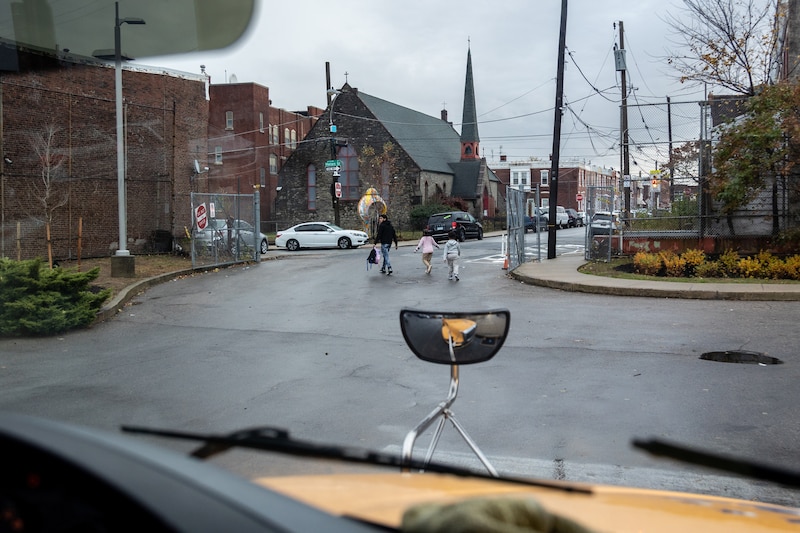
But Arabia has high hopes for Virola-Romero, who will greet parents as they walk in the building and show them what the school has to offer.
Webster is also using the opioid funds for a Saturday school program. Like the other principals, Arabia said the intent is to give students safe spaces, help them learn a bit more, and “making sure our students are safe and loved,” Arabia said.
Arabia said her plan is to keep the climate specialist position beyond the two years that will be paid for using the opioid settlement money. But it depends on the school’s budget.
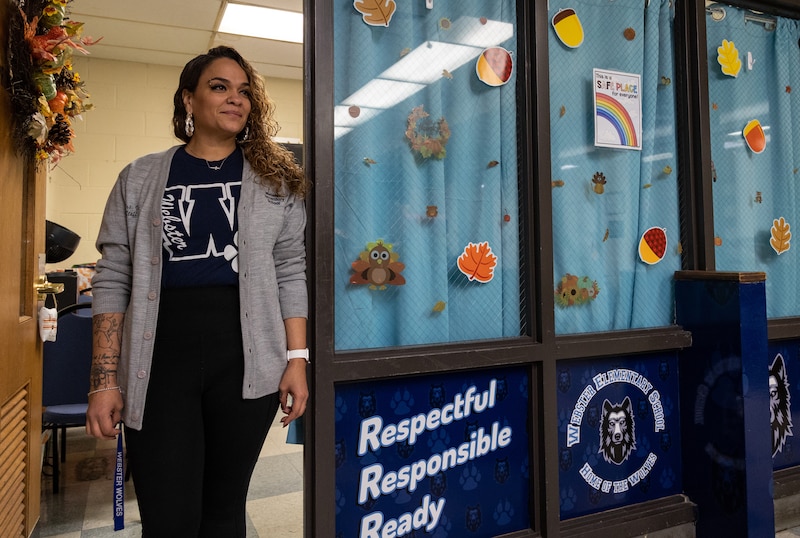
Money will help students discover careers, healthy habits
Mastbaum High School used to enroll more kids from other parts of the city. No longer.
“We just kind of slipped out of mind with a lot of the community,” Said David Lon, Mastbaum principal.
Mastbaum is funding a new drum line for students. It’s also building a new fitness center in its old locker room. The previous fitness center is full of broken gym equipment. Lon said students need more spaces where they can practice healthy habits.
Mastbaum has also hired three staff members for three years through the Kensington nonprofit 12PLUS. They will help students get jobs, apply to college and financial aid, and provide mentorship for two years after they graduate.
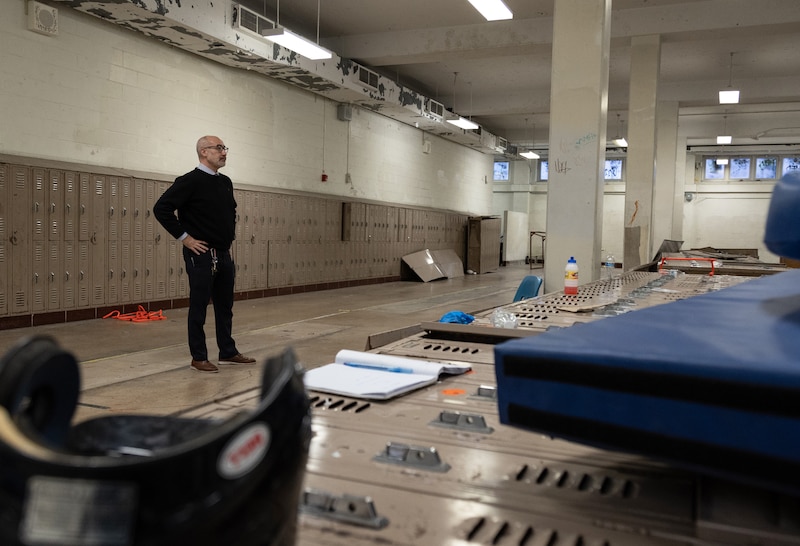
The 12PLUS staff will provide the logistical support that many families need, Lon said.
It’s difficult just to get students to graduate, and then Mastbaum mostly loses touch with them once they do, Lon said. So hiring the new staff members is like an “investment in their future.”
“To be able to place a student upon graduation into the Navy shipyard, and right off the bat, they’re making $30 an hour, on a pathway to ... a six-figure salary,” Lon said. “This will be an intensive layer of support to ensure that they are getting critical scaffolds to reach those dreams that they have.”
Overall Lon said his plan for the opioid dollars was aligned with “the spirit of recovery.”
“That’s the spirit of providing beautiful utility to students that walk through a community where many aspects of beauty have been stripped out of it,” Lon said. “And is it all of the money that we would maybe deserve in an ideal universe? Probably not, but it’s a start, and we’re thankful for that start.”

